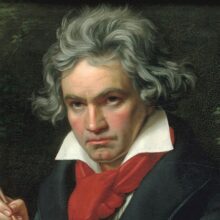 Born in Bonn, Germany, on December 17, 1770, Beethoven's life and work encapsulate a period of immense artistic and societal change, and his artistic journey paved the way for the Romantic era of music. He was born into a family of modest means, with his father, Johann, being a musician himself. Recognizing Beethoven's musical talent at an early age, his father began grooming him as a child prodigy, hoping to replicate the success of Wolfgang Amadeus Mozart. However, Beethoven's life took a significant turn when his father's alcoholism and financial difficulties led to a tumultuous household environment. Nevertheless, he received good, formal training from prominent musicians of the time, including Christian Gottlob Neefe, who recognized and nurtured Beethoven's potential. In his early years, Beethoven displayed virtuosity as a pianist and composer, and by the age of 17, he had already composed several piano sonatas and chamber works.
Born in Bonn, Germany, on December 17, 1770, Beethoven's life and work encapsulate a period of immense artistic and societal change, and his artistic journey paved the way for the Romantic era of music. He was born into a family of modest means, with his father, Johann, being a musician himself. Recognizing Beethoven's musical talent at an early age, his father began grooming him as a child prodigy, hoping to replicate the success of Wolfgang Amadeus Mozart. However, Beethoven's life took a significant turn when his father's alcoholism and financial difficulties led to a tumultuous household environment. Nevertheless, he received good, formal training from prominent musicians of the time, including Christian Gottlob Neefe, who recognized and nurtured Beethoven's potential. In his early years, Beethoven displayed virtuosity as a pianist and composer, and by the age of 17, he had already composed several piano sonatas and chamber works.
In 1792, Beethoven moved to Vienna, the epicenter of European music at the time, to study composition with Joseph Haydn. Vienna provided him with the intellectual and artistic milieu necessary for his creative growth. During this period, he began to establish himself as a formidable pianist and composer, impressing audiences with his innovative compositions and his prowess at the keyboard.
Beethoven's early works were strongly influenced by classical forms and structures, following in the footsteps of Haydn and Mozart. However, as he gained confidence and experience, he started to push the boundaries of these conventions. His compositions became more daring, showcasing his distinct voice and a growing sense of individualism. His Piano Sonata No. 14 in C-sharp minor, famously known as the "Moonlight Sonata," and Symphony No. 3 in E-flat major, the "Eroica," can be said to have been markers for this transition.
Around 1801, Beethoven began to experience hearing difficulties, which eventually escalated to complete deafness. In a letter known as the "Heiligenstadt Testament," written to his brothers in 1802, Beethoven expressed his anguish over his deteriorating hearing and his contemplation of suicide. However, he ultimately resolved to overcome his challenges and dedicate his life to his art. This period of intense struggle and introspection marked a turning point in Beethoven's creative output. His compositions become more introspective, expressing deep emotions and inner turmoil.
Beethoven's late period saw a continuation of his exploration of human emotion and the boundaries of musical expression. Struggling with isolation due to his deafness and plagued by health issues, he channeled his innermost thoughts and feelings into compositions that are often described as spiritual and transcendent. The late string quartets, composed towards the end of his life, stand as some of the most enigmatic and profound works in the chamber music repertoire.
The Ninth Symphony, Beethoven's final complete symphonic work, is perhaps his most iconic composition. Incorporating choral forces in the final movement, Beethoven set Friedrich Schiller's "Ode to Joy" to music, creating a symphonic masterpiece that celebrates the unity of humanity. The Ninth Symphony not only pushed the boundaries of symphonic form but also affirmed Beethoven's belief in the unifying and uplifting power of art.
Beethoven died on 26th March 1827, in Vienna. It was, literally, a dark and stormy night... well, early evening anyway. According to his friend Hüttenbrenner who was one of only two people present, at about 5 pm there was a flash of lightning and a clap of thunder: "Beethoven opened his eyes, lifted his right hand and looked up for several seconds with his fist clenched ... not another breath, not a heartbeat more." He was only 56. Thousands of people attended his funeral procession (possibly up to 30,000) and composers such as Hummel and Schubert participated as either pall- or torch-bearers. He didn't get to rest in peace, however: he was exhumed in 1863 for medical assessment and then (eventually, in 1888) re-buried next to Schubert, in Vienna's Zentralfriedhof cemetery. His music, happily, has long outlived him and remains a staple of the concert hall repertoire.
Music Plays from my collection
(since January 9th 2021)
| Date of Play | Time of Play | Genre | Composition | Length | Play Count |
|---|---|---|---|---|---|
| Date of Play | Time of Play | Genre | Composition | Length | Play Count |